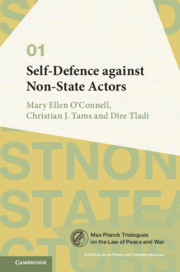Book contents
- Self-Defence against Non-State Actors
- Max Planck Trialogues on the Law of Peace and War
- Self-Defence against Non-State Actors
- Copyright page
- Contents
- Introduction to the Series: Trialogical International Law
- Introduction Dilution of Self-Defence and its Discontents
- 1 The Use of Force in Self-Defence against Non-State Actors, Decline of Collective Security and the Rise of Unilateralism: Whither International Law?
- 2 Self-Defence against Non-State Actors: Making Sense of the ‘Armed Attack’ Requirement
- 3 Self-Defence, Pernicious Doctrines, Peremptory Norms
- Conclusion Self-Defence against Non-State Actors – The Way Ahead
- Index
1 - The Use of Force in Self-Defence against Non-State Actors, Decline of Collective Security and the Rise of Unilateralism: Whither International Law?
Published online by Cambridge University Press: 29 July 2019
- Self-Defence against Non-State Actors
- Max Planck Trialogues on the Law of Peace and War
- Self-Defence against Non-State Actors
- Copyright page
- Contents
- Introduction to the Series: Trialogical International Law
- Introduction Dilution of Self-Defence and its Discontents
- 1 The Use of Force in Self-Defence against Non-State Actors, Decline of Collective Security and the Rise of Unilateralism: Whither International Law?
- 2 Self-Defence against Non-State Actors: Making Sense of the ‘Armed Attack’ Requirement
- 3 Self-Defence, Pernicious Doctrines, Peremptory Norms
- Conclusion Self-Defence against Non-State Actors – The Way Ahead
- Index
Summary
This Trialogue concerns the use of force in self-defence against non-State actors in the territory of third States under international law. International law relating to the use of force, in particular international law on the rules of self-defence, is immensely important. It is immensely important because one of the most fundamental objectives of modern international law, and an overriding objective of the UN Charter, is the prevention of war.1 International law on the use of force provides the framework within which the objective recited in the preamble of the UN Charter to ‘save succeeding generations from the scourge of war’ is pursued by the United Nations. Having clear and precise scope and limits of this law is necessary to achieving this lofty objective. Yet the importance of the international law on the use of force is matched by the controversy surrounding the very scope and limits of the law on the use of force.
- Type
- Chapter
- Information
- Self-Defence against Non-State Actors , pp. 14 - 89Publisher: Cambridge University PressPrint publication year: 2019
- 1
- Cited by



